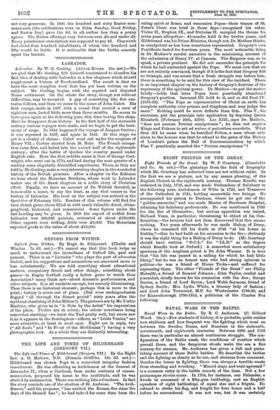EIGHT FRIENDS OF THE GREAT.
Eight Friends of the Great. By W. P. Courtney. (Constable and Co. 6s. net.)—The gleanings from the field of biography which Mr. Courtney has collected here are not without value. In the first we see a picture, not by any means pleasing, of the English Church in the eighteenth century. Thomas Rundle was ordained in July, 1716, and was made Prebendary of Salisbury in the following year, Archdeacon of Wilts in 1720, and Treasurer of the Cathedral in 1721, holding meanwhile two livings. He accompanied his patron to Durham, where he got one of the "golden canaries," and was made Master of Sherburn Hospital, retaini g his Salisbury preferments. He was mentioned in 1733 for the See of Gloucester ; but serious opposition was ;raised, Richard Venn, in particular, threatening to object at his Con- firmation,—the lawyers had not then discovered that this means nothing. Two years afterwards he was made Bishop of Derry, where he remained till his death in 1743 "at his house in Dublin,"—this he had built on his accession to the See ; obviously it was the right thing for a Bishop of Derry to do. (Mr. Courtney should have written " D.C.L." for " LL.D." as the degree which Rundle took at Oxford.) A somewhat more satisfactory specimen of the Anglican priest is Dr. John Warner. It is true that "his life was passed in a calling for which he had little Iiirine but he was an honest man who had strong opinions in politics—he was a friend of Horne Tooke—and suffered for expressing them. The other "Friends of the Great " are Philip Metcalfe, a friend of Samuel Johnson ; John Taylor, oculist and journalist, chiefly known for his connexion with the Bun; Scrope Davies, a friend of Lord Byron; Lord Webb Seymour, friend of Sydney Smith ; Mrs. Lydia White, a literary lady of fashion ; and Lord John Townsend, M.P. for Westminster 1788-90, and for Knaresborough 1790-1813, a politician of the Charles Fox following.






















































 Previous page
Previous page